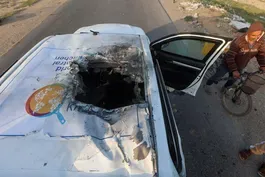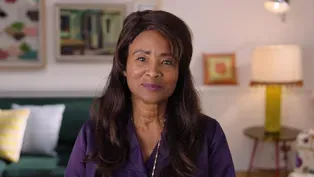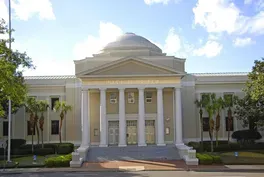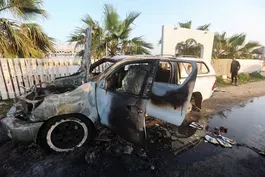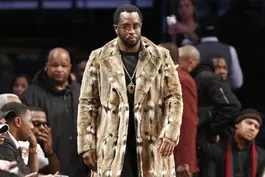
Buttigieg on federal role in rebuilding Baltimore bridge
Clip: 4/2/2024 | 8m 23sVideo has Closed Captions
Buttigieg: 'We will tear down bureaucratic barriers' to rebuild Baltimore bridge
A massive operation is underway at the site of the deadly bridge collapse in Baltimore. Crews are undertaking painstaking tasks, removing sharp twisted steel and concrete debris from the port. No one knows yet how long it will take to clean up the wreckage and open the channel. Transportation Secretary Pete Buttigieg will play a key role in all of this and joined Geoff Bennett to discuss more.
Problems with Closed Captions? Closed Captioning Feedback
Problems with Closed Captions? Closed Captioning Feedback
Major corporate funding for the PBS News Hour is provided by BDO, BNSF, Consumer Cellular, American Cruise Lines, and Raymond James. Funding for the PBS NewsHour Weekend is provided by...

Buttigieg on federal role in rebuilding Baltimore bridge
Clip: 4/2/2024 | 8m 23sVideo has Closed Captions
A massive operation is underway at the site of the deadly bridge collapse in Baltimore. Crews are undertaking painstaking tasks, removing sharp twisted steel and concrete debris from the port. No one knows yet how long it will take to clean up the wreckage and open the channel. Transportation Secretary Pete Buttigieg will play a key role in all of this and joined Geoff Bennett to discuss more.
Problems with Closed Captions? Closed Captioning Feedback
How to Watch PBS News Hour
PBS News Hour is available to stream on pbs.org and the free PBS App, available on iPhone, Apple TV, Android TV, Android smartphones, Amazon Fire TV, Amazon Fire Tablet, Roku, Samsung Smart TV, and Vizio.
Providing Support for PBS.org
Learn Moreabout PBS online sponsorshipGEOFF BENNETT: A massive cleanup operation is under way at the site of the deadly bridge collapse in Baltimore last week.
Crews are undertaking painstaking tasks, removing sharp, twisted steel and concrete debris from the port.
No one knows just yet how long it will take to clean up the wreckage and reopen the channel.
But the Biden administration has pledged to help rebuild the bridge, and the president is expected to ask for more federal funding soon to make that happen.
Transportation Secretary Pete Buttigieg is going to play a key role in all of this.
And he joins us now.
Welcome back to the "NewsHour."
PETE BUTTIGIEG, U.S. Secretary of Transportation: Good to be back with you.
GEOFF BENNETT: The Washington Post reported that rebuilding the Francis Scott Key Bridge will take years and cost hundreds of millions of dollars.
Do you agree with that assessment?
And how difficult will it be to get that funding, given Congress' inability to pass much of anything these days?
PETE BUTTIGIEG: That assessment is certainly plausible.
We have not yet seen a hard timeline.
And, remember, there are a lot of things yet to be known, both in terms of the condition of the parts of the bridge that did not collapse, and in terms of the design of what will take its place.
For example, one advantage of having a design that's identical or similar to the old bridge is, it could be done more quickly.
On the other hand there may be advantages to having a different design.
Those are decisions that the state, under the leadership of Governor Moore, will work through.
We're not going to dictate that.
What we are going to do is make sure that there's funding and, whenever requested, technical assistance to help them get that job done.
We have already moved the first $60 million made available through our emergency relief program.
There is certainly going to be a need for more funding.
We will do what we can with the dollars we have, but, if we need to turn to Congress for more dollars, I hope and expect that that will be a bipartisan priority.
If you think back to the Minnesota bridge collapse back in 2007, it was a matter of days before Congress passed legislation to get more funding to make sure that they were able to rebuild that bridge.
And a little more recently, the bipartisan infrastructure package itself was delivered with a bipartisan vote.
So I know that this is a polarized time, but I'd like to think, if there's anything that Democrats and Republicans can come together on, it's supporting a part of our country that is hurting and getting infrastructure back the way it needs to be.
GEOFF BENNETT: Will the administration waive certain regulations to speed up the process of clearing the debris and ultimately rebuilding the bridge?
PETE BUTTIGIEG: We will tear down any bureaucratic or administrative barrier that we responsibly can.
To be clear, this has to be done safely.
It has to be done properly, whether we're talking about checks to make sure that taxpayer funds are being used the right way or any safety consideration.
But within that and within the framework of the law, we're going to provide as much flexibility as we responsibly can because we have got to get this port back open and we have got to get that bridge back up.
The port reopening will, of course, come sooner than the bridge replacement, but both of those are important, not just for Baltimore, but really for our supply chains, for the U.S. economy.
We have got to do everything we can to get it done.
GEOFF BENNETT: I want to ask you about rail safety, because you announced a new rule today requiring two-person crews on railroads in a move to improve safety after that toxic derailment in East Palestine last year.
The railroads say that the size of train crews should be determined by union contract talks, and not by federal regulators, since there isn't enough data to support this notion that two-person crews are actually safer.
What's your reaction to that?
PETE BUTTIGIEG: I would start with common sense.
The idea that you could run a two-mile-long train, maybe even a longer train than that - - some of them are getting closer to three miles -- and have only one human being on board that train, my guess is, most Americans would be surprised to learn that, until this morning, that wasn't already prevented.
We're talking about the absolute commonsense minimum here of having two people on board a freight train that could be moving through an American community.
And, again, these trains are getting to be two-miles-long or longer.
Now, this is something that was developed actually back in the Obama administration, was the first work done on this.
The Trump administration halted that work.
We picked that work back up even before what happened in East Palestine, but our attention to rail safety measures, including this one, was, of course, supercharged by the national focus on railroad safety that East Palestine brought.
And that's just one of many areas that we have been working on.
I also want to reiterate my call on Congress to do more.
They have a Bipartisan Railway Safety Act just sitting there waiting its turn.
It's been more than a year since that Ohio crash.
Congress needs to act.
Anything that doesn't require an act of Congress, we're going to seek to do on our own here at the department, like today's rule.
GEOFF BENNETT: You know, it strikes me freight trains are getting longer in the U.S., as you say, in some cases three-miles-long.
You also have cargo ships that are in some cases now dangerously big, like the one that caused the bridge collapse in Baltimore.
In your view, are the modes of transport getting too big, or do we need to improve our capacity and our infrastructure to accommodate them?
PETE BUTTIGIEG: I think it really depends on the mode of transportation.
It's not automatically intrinsically safe -- unsafe to have a larger ship or a larger train or, for that matter, a larger vehicle or a larger aircraft.
But it is very important that every step be taken to make sure that, as they grow or as they have any other feature that's different from before, that it is safer than ever.
And that's where regulation comes in.
It's vitally important that we maintain the pattern we have had in this country of making our modes of transportation more safe.
And we still have a long way to go, especially on highway safety, but also in railroad safety.
GEOFF BENNETT: Lastly, a question about Boeing.
They're facing a significant safety crisis after that door panel flew off at Alaska Airlines flight some months ago.
The company's CEO announced that he's leaving at the end of the year.
The head of the commercial airplanes at Boeing has already left.
What concerns remain?
Is this leadership overhaul sufficient?
PETE BUTTIGIEG: I would say it's going to take a lot more than what individual has what title at that company.
And that's something I have communicated to the senior leadership at Boeing.
It's something that our FAA administrator, Mike Whitaker, made clear after his visit to their key manufacturing facility, and has put them on a 90-day clock -- we're roughly 30 days into that -- to put together a comprehensive plan.
And FAA is not going to let them increase their rate of production until and unless they demonstrate that they can do it safely.
We're talking about operational issues.
We're talking about observations that were caught in the audit on the shop floor, but we're also talking about culture.
And I would say that whoever lines up at the helm of Boeing, as well as their board and everybody up and down that entire organization, they all have to be prepared to put safety first.
So much depends on it.
Look, the aviation safety record of the United States of America is extraordinary.
But there is nothing about that that guarantees that it'll be the same for the future.
That's why every incident like this gets an extraordinary amount of attention.
It's why Boeing is under a microscope, and it's why it's going to stay that way as they work to demonstrate that they can safely increase their production.
GEOFF BENNETT: Do you feel safe flying on a Boeing-made jet?
PETE BUTTIGIEG: I fly on a Boeing made jet just about every other day.
And, yes, every time I step on an airliner, I know that I am safe.
And if I'm with my family, I know that my family is safe because of all of the work that goes into overseeing that, the work of the FAA, the work of all of the professionals in the aviation sector, including, importantly, those flight crews on board, who do such good work.
Every time I get on that airplane, I know I'm participating in the safest mode of transportation in America, which is an astonishing thing, if you consider what air travel is, flying through the air at nearly the speed of sound.
But, again, you can't take that for granted.
Safety is not a destination.
It is something that we have to continually work toward and reinforce.
GEOFF BENNETT: That is Transportation Secretary Pete Buttigieg.
Thanks again for your time and for your insights this evening.
PETE BUTTIGIEG: Thank you.
Anera pauses Gaza aid after Israeli strike on WCK workers
Video has Closed Captions
Head of Anera discusses pausing Gaza aid operation after Israeli strike kills WCK workers (6m 4s)
A Brief But Spectacular take on inspiring a love of learning
Video has Closed Captions
A Brief But Spectacular take on inspiring a love of learning (3m 13s)
Florida Supreme Court clears way for 6-week abortion ban
Video has Closed Captions
Florida Supreme Court clears way for 6-week abortion ban, but voters will decide issue (5m 20s)
Israeli strike killing 7 WCK aid workers sparks outrage
Video has Closed Captions
Israeli strike killing 7 World Central Kitchen members sparks international outrage (4m 15s)
A look at the investigations surrounding Sean "Diddy" Combs
Video has Closed Captions
A look at the sex trafficking investigations surrounding music mogul Sean "Diddy" Combs (5m 42s)
New book explores evolving role of America's First Ladies
Video has Closed Captions
New book explores the evolving role of America's First Ladies (6m 23s)
Novel retells ‘Huckleberry Finn’ from Jim's point of view
Video has Closed Captions
Percival Everett on his novel retelling ‘Huckleberry Finn’ from Jim's point of view (7m 28s)
Providing Support for PBS.org
Learn Moreabout PBS online sponsorshipSupport for PBS provided by:
Major corporate funding for the PBS News Hour is provided by BDO, BNSF, Consumer Cellular, American Cruise Lines, and Raymond James. Funding for the PBS NewsHour Weekend is provided by...
